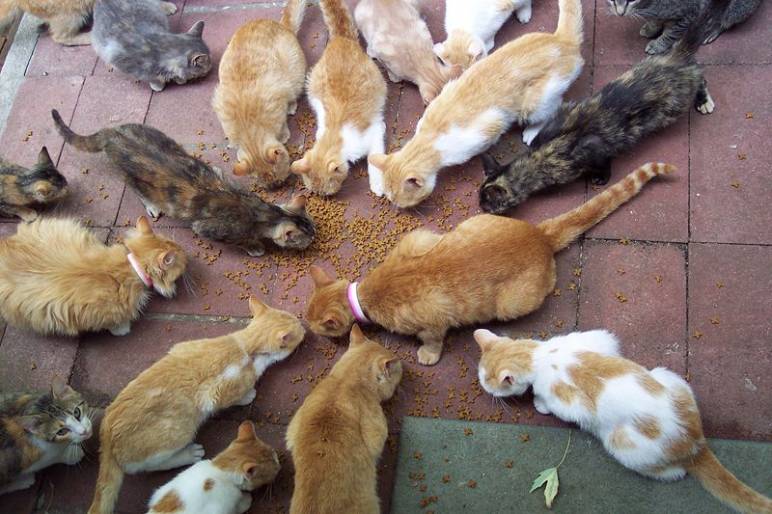Neutering
Freshfields ‘Neuter Your Pet’ Campaign
Animal Rescue charities exist to take on the burden of the homeless and unwanted. These animals come to us for a vast number of reasons and many of those reasons are beyond the control of their otherwise loving owners. In so many of the cases where we offer help, those owners are victims too, and they suffer greatly when circumstances demand they lose their animal companions from their lives.
There are other cases however, where owners let their pets down badly, create situations that could easily have been avoided, and that result in an increase in the number of the UKs unwanted animal population! These situations often also cause unnecessary suffering to their pets.
So, what are these situations, you are no doubt wondering?
Situation 1:
The misconception that it’s OK to allow your pet dog, cat, rabbit or other to have just one litter of babies because a) they will enjoy being a mum, b) it will be easy to find homes for the offspring, c) it’s natural.
Situation 2:
The belief that it’s acceptable to breed from your pet because a) all of the reasons stated in situation 1 above plus b) it’s an additional source of income, c) it will be straight forward and easy.
Situation 3:
The belief that it’s acceptable to not castrate your dog, because it would be an affront to his masculinity and yours!
Breeding, whether deliberate or accidental, inevitably increases the overall number of companion animals within the UK, every sale or re-homing that doesn’t work out, adds to the number of unwanted and homeless pets, and places additional burden upon the rescue centres that have to deal with the daily cries for help.
Multiple situations… One simple solution! NEUTER YOUR PET!
At Freshfields Animal Rescue we are passionate about neutering! Neutering where safe and practical is the hallmark of responsible pet ownership! Not only is it the solution to the overpopulation problem, it also comes with many health benefits to ensure that much loved pets remain healthy, for longer!
We neuter all of our dogs, cats, rabbits, ferrets, male guinea pigs and male chinchillas before rehoming and we advocate neutering as a crucial part of responsible pet ownership. For specifics relating to the benefits for individual animal types please click on the relevant buttons.
Neutering your Cat
What is neutering?
Neutering is a pretty straight forward and common operation, performed under general anaesthetic. Males are castrated. This means that the testicles are removed. Females are spayed, which means that the womb and ovaries are removed. Recovery is usually quite quick, and there are often no stitches to be removed.
What are the benefits?
Females can have up to 3 litters a year, each one containing as many as 8-10 kittens. They can become pregnant as early as 4 months old! Pregnancies can be very costly. Spaying will prevent this happening.
Unneutered females will call and wail every 3 weeks throughout the breeding season to attract a mate, again spaying will prevent this happening.
Spaying your female cat will prevent the risk of ovarian and uterine cancer, it will also greatly reduce the risk of mammary tumours.
Females are at risk from being injured during mating, and can contract diseases spread through sexual contact. As spayed cats no longer come into season they will no longer be at risk from either of these.
Castrating will stop males mating with females and adding to the existing unwanted cat problem. When males remain un-neutered they tend to be smelly. They will spray strong smelling urine in the house and garden to mark their territory.
Males will roam many miles in order to find females in heat, and are also more likely to fight with other male cats. Fighting can lead to wounds and abscesses, and the spread of serious diseases like FIV (feline Aids). Both these things may lead to large vet bills, but also many cats are killed on roads or lost forever when they roam. Neutering will mean your cat doesn’t feel the need to roam! Neutering will also remove the risk of testicular tumours.
It is also very important to remember that pedigree cats not just pedigree dogs, can be stolen in order to be bred from. Neutering will reduce this risk.
What are the negatives?
There are none!
Some owners worry about the anaesthetic risk. Although there is a small risk to any animal/human animal undertaking surgery this is minor. Neutering is a very common procedure, and veterinary centres have state of the art equipment! Neutering is common practice for most vets therefore they tend to be very experienced in this area. If in doubt, chat to your veterinary practice.
When should I neuter?
Cats can be neutered from 5-6 months old, possibly even younger, and at any other time. If a female is in season, lactating or pregnant you need your vet will advise you regarding the most appropriate time.
Please be a responsible owner – neuter your pet!
Neutering your Dog
Did you know that just one un-neutered female dog and her offspring can produce 67,000 puppies in only 6 years! This is why neutering is so important. Dogs cannot be just left to bred as and when they want because, as the figures prove, things very quickly get out of control (in fact they already are out of control). We humans are responsible for the original domestication of dogs; we imported them and bred them, tailoring their physical makeup to match our personal wants and desires. It is now our responsibility not to let the dog population become unhealthy and unwanted. Neutering is the answer!
What is neutering?
Neutering is a straight forward and common operation, performed under general anesthetic. Males are castrated. This means that the testicles are removed. Females are spayed, which means that the womb and ovaries are removed. Recovery is usually quite quick, and there are often no stitches to be removed.
What are the benefits?
The benefits to your dog are huge –
Females will no longer come into season every 6 months. This is when the dog can bleed for up to 3 weeks.
Male dogs can smell a female in season from miles away. This means you may have unwanted dogs hanging around your house, and following your dog on walks. They can be very persistent and annoying to both you and your dog! It is also possible that males will jump into back gardens to mate with your dog, this could even happen on walks if your dog wanders off or if the male is really pushy, even when you are walking with your female on her lead. It really doesn’t take long and you and your poor dog are left with an unwanted pregnancy.
Neutering will prevent your dog getting the very serious conditions of cervical cancer and pyometra. Both of these can be fatal. If your dog is neutered before 4 years of age it will also decrease the risk of mammary cancer. If your dog does suffer from any of these conditions, she will endure tremendous pain and discomfort and your vet bills will be extremely high.
Neutering also stops your dog from being affected by false pregnancies. A false, or ‘phantom’ pregnancy can be very distressing for a dog – they suffer from all the symptoms of pregnancy, even producing milk, but no puppies appear.
After neutering males will not want to mate with females anymore. Remember that male dogs do not think in the same way as humans – left un-neutered they are full of raging hormones and testosterone and they don’t know why or what to do with it! This leads to frustration and unwanted behaviour. Neutering must be a huge relief to male dogs!
Neutering can help prevent many behavioural problems such as excessive barking, aggressiveness – particularly towards other male dogs, hypersexual behaviour, roaming to find females on heat, mounting animals, people, cushions, and bedding, and inappropriate urination and marking.
When an un-neutered male can smell a female on heat he will travel for miles to find her. This includes crossing roads and jumping fences. These dogs can cause all kinds of problems for other people, but they can also seriously injure themselves – which means big vet bills for you – or even being killed. Neutering stops all this!
Neutering will prevent testicular cancer, and greatly reduces the risk of prostate cancer.
It is also very important to remember that any dog, not just pedigrees, may be stolen to be bred from. Neutering will reduce this risk.
What are the negatives?
There are none!
It is a myth that neutered dogs put on weight and become lazy. This is simply not true. This will only happen to your dog if you over feed them and do not give them enough exercise.
It has also been said that neutering may cause incontinence in later life. There is at present absolutely no medical evidence to support this.
Some owners worry about the anesthetic risk. Although there is a risk to any animal or human undertaking surgery these risks are minor. Neutering is a very common procedure, and veterinary centres have state of the art equipment! If you remain concerned about anesthetics please don’t just leave it, speak to your vet for reassurance, the benefits from neutering far outweigh any risks.
When should I neuter?
We recommend neutering both males and females at 6 months old, but females can be neutered at any time as long as they are not in season. Spaying before a female has ever has a season is common; this makes surgery easier and safer as the womb is smaller. Your dog will also recover quicker and the cost of the surgery will be cheaper!
If you have a female dog and you believe she may have just become pregnant, please seek veterinary advice. In the really early stages it may be possible to halt the pregnancy, whilst this is very much a decision that will be influenced by your own ethical stance, part of that consideration must be the long-term wellbeing of any new lives brought into this world.
Please be a responsible owner – neuter your pet!
Neutering your Ferret
Ferrets have become popular pets in recent years. They have a cheeky and inquisitive nature, and domestic ferrets are very sociable. They prefer to live in groups, although it does depend on the individual. Neutering is essential before ferrets can live together and, when you take into account they can live for 6 – 10 years, it’s obvious how important this is. Neutering and contraception are available to ferrets, and are highly recommended to prevent health and behavioural problems, in addition to reducing the number of unwanted ferrets born as a result of accidental pregnancies.
Hundreds of ferrets find their way to rescues every year. These poor animals have been abandoned, have escaped and become lost, or been given up because their owners could not afford veterinary fees, or they were just unprepared for the unique nature of the ferret. As with every other pet, ferrets need daily care and attention, and a life-long commitment.
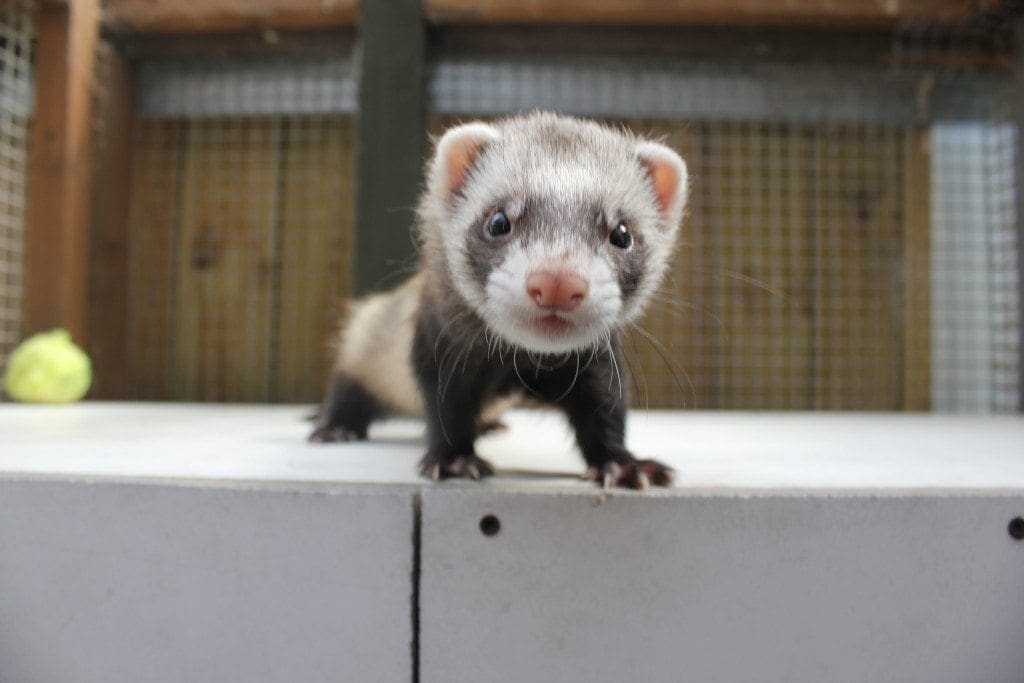
The benefits of neutering…
One important reason for neutering is so that ferrets can live together in groups, which will enrich their lives tremendously.
Females only release an egg through the act of mating. This means that once they come into season they remain in season until they are mated. Remaining in season can cause severe health problems including alopecia (hair loss) and oestrogen-associated anaemia (deficiency in red blood cells) which can prove fatal. Neutering will solve this problem, contraception is also available.
Neutering of males will reduce aggressive behaviour and the very musky smell associated with the maturing male. Left unneutered they may have a greasy coat and spray urine everywhere! Males will also become more playful after neutering.
A neutered male is still capable of mating, although this is not advised as it is often quite violent and stressful for the female. Injuries may be caused to the female’s neck.
Neutering is generally cheaper that contraception methods.
Contraception
Contraception is available to both females and males. This involves placing a chemical implant under the ferret’s skin whilst they are sedated. This is only slightly larger than a pet microchip. How frequently these are given will depend on the amount of hormone in the implant and the cost the owner is willing to pay. The drug in the implant is called Deslorelin.
What are the negatives of neutering?
Surgical neutering of both sexes has been linked to the occurrence of hyperadrenocorticism (adrenal disease) and adrenal tumours. This may be caused by the excessive production of sex hormones following neutering. Signs of this include hair loss, swelling of the genital area, urinary blockage, and itchiness.
When should I neuter?
It is advised that surgical neutering should be performed before puberty, this should delay the possible onset of adrenal disease.
Ferrets become sexually mature at 6 – 9 months so neutering is advised before this time.
It is important to discuss the benefits of both surgical neutering and chemical contraception with your vet.
For rescue ferrets, it is not always possible to accurately age an animal and of course, we so often have no prior life history. For this reason, the decision to neuter is based upon the long-term overall health of the animal and this will include the ferret’s emotional health and well-being, its need for companionship and a group environment and equally importantly the responsibility the charity has to prevent a population boom.
Please be a responsible owner – neuter your pet!
Neutering your Rabbit
Rabbits are one of the most prolific breeders around, hence the saying ‘breeding like rabbits’. Unbelievably rabbits can become pregnant the day after giving birth, and litters often contain as many as 14 babies. It’s clear to see how important it is for owners to be responsible and to neuter pet rabbits.
There is also another very important reason to neuter though – rabbits are sociable creatures and they NEED to live with the company of other rabbits. If they are not neutered pregnancy and aggression fears will prevent them being able to live in groups or as a pair. By not neutering your rabbit you are forcing it to live alone. This is unacceptable.
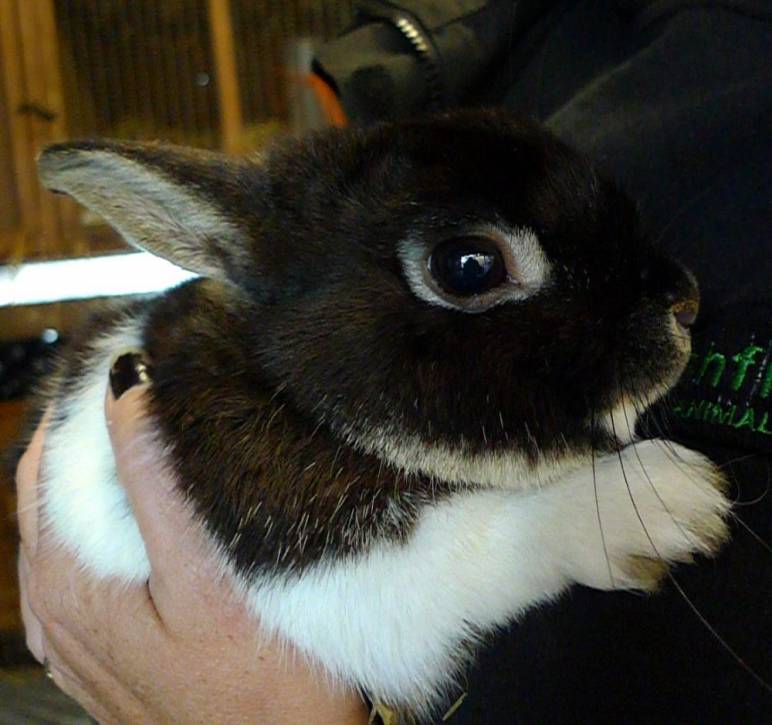
What is neutering?
Neutering is a pretty straight forward and common operation, performed under general anaesthetic. Males are castrated. This means that the testicles are removed. Females are spayed, which means that the womb and ovaries are removed. Recovery is usually quite quick, and there are often no stitches to be removed.
What are the benefits?
The benefits to your rabbit are huge –
Neutering will mean your rabbit can have the company of other rabbits, without pregnancies or fighting. The company of other rabbits is hugely important. After neutering, a male can live happily with another neutered male or with a female rabbit. (after the usual introductions of course).
Male rabbits tend to be territorial and frequently spray urine. Neutering stops all spraying.
Male rabbits are often aggressive, but neutering usually stops this and the rabbit is much happier and more relaxed. This is because they do not have to spend all their time looking for a mate!
Unneutered male rabbits are at risk from testicular cancer, neutering will remove this risk. Females can also be territorial and aggressive from about 4-6 months old. Neutering stops this.
Without neutering up to 80% female rabbits develop uterine cancer by the age of 5 years.
Females can also develop ovarian cancer and pyometra when they are not neutered.
Neutering also prevents repeated false pregnancies, during which rabbits can growl and bite and scratch their owners and other rabbits.
Neutered females are likely to live longer than unneutered ones.
When should I neuter?
Males can be neutered as soon as their testicles descend at 10-12 weeks. Most vets usually wait until the rabbit is 4-5 months old. Female neutering is usually left until about 6 months. There are some campaigns in place which recommend neutering much earlier because the longer neutering is left, the longer a rabbit has to live alone, and the chances of successfully mixing it with other rabbits is reduced.
At one time it seemed that rabbits were more difficult to anaesthetise than other animals, but that has changed over recent years. More experienced vets and modern techniques and equipment mean rabbit neutering is almost as safe as it is in cats. Rabbits need to be healthy and the correct weight before surgery.
You should always make the effort to find a rabbit -friendly vet. Ask how experienced they are with rabbits, do they neuter both sexes regularly, how do they care for them post operatively, are they kept away from other animals etc? It is very worthwhile taking the time to investigate the procedure and who will be doing it.
Please be a responsible owner – neuter your pet!
Neutering your Small Animal
Owners, should always take the time to ensure they understand all of the needs of a small pet and neuter them where applicable to help prevent even more unwanted animals!
Guinea Pigs:
A female guinea pig can become pregnant at 4 weeks old by a male of around the same age. It is therefore crucial that males and females are not left together after they are 3 weeks old.
The safest and kindest thing is to not allow your female to breed. There are many risks faced by a pregnant female – blood loss after birth, infection, toxaemia, and other complications. It is said that 1 out of every 4-5 females will die giving birth. If a female gets pregnant for the first time when they are older than 12 months it is likely that the females pelvic bone area will have become rigid. This means that it is inflexible and there will be no way for the babies to be born. An emergency C-section would be needed but survival of the mother and young is rare. Mothers can often injure and even kill their young because of inexperience, they can also miscarry and eat their young if they are themselves in poor health. Not breeding will make for a happier, healthier female, who has a longer life.
A female that that just given birth is fertile immediately.
To prevent a female guinea pig becoming pregnant… Neuter your male!
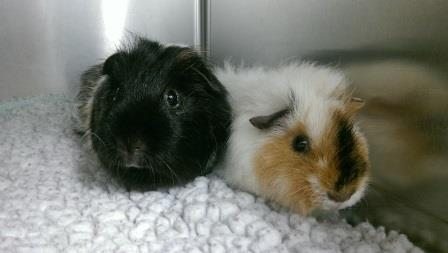
Hamsters:
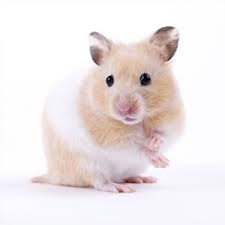 The most popular type of pet hamster is the Syrian and the Russian dwarf. Syrians can get pregnant at just 4 weeks of age, the Russian dwarf from 3-4 months. Mothers and young cannot stay together past 4 weeks as they will start to breed with each other. When you consider that a hamster can have between 1 and 20 babies in one litter it’s obvious just how quickly the numbers can get out of control!
The most popular type of pet hamster is the Syrian and the Russian dwarf. Syrians can get pregnant at just 4 weeks of age, the Russian dwarf from 3-4 months. Mothers and young cannot stay together past 4 weeks as they will start to breed with each other. When you consider that a hamster can have between 1 and 20 babies in one litter it’s obvious just how quickly the numbers can get out of control!
Hamsters suffer from the same reproductive diseases that dogs and cats do. Males may suffer testicular cancers and females, uterine cancer, mammary tumours, and Pyometra. Neutering can eliminate these conditions and, while there are some risks to surgery, the benefits do outweigh these.
Neutering can also help with behavioural issues such as aggression.
An experienced vet will have no issue neutering your hamster. You should always take the time to research the best possible place for neutering.
The recommended age for neutering is 6 to 8 months of age.
Rats:
The highly sociable and intelligent rat should always live as part of a group. This of course is often not possible if they are not neutered. A female rat goes in to heat every 4 days, this can make her grumpy, excited, and frantic. If living alongside an unneutered male pregnancy would occur in a matter of days!
Without neutering mammary tumours are extremely common in pet rats of both sexes.
One study found that 49% of unneutered females developed mammary tumours, and 66% developed pituitary tumours. Of the neutered females only 4% developed each type of tumour. This proves what massive health benefits neutering has for rats.
Male rats who are neutered may display less aggressive behaviour towards other rats, resulting in less fights and therefore fewer injuries. Neutering will also either significantly reduce of completely eliminate scent marking. It also prevents testicular tumours.
The males coat will appear smoother after neutering.
Females should be neutered between 3-6 months of age males can often be neutered at an earlier age depending upon the rate at which their bodies have matured.
Donate Here
Lost & Found Pets

Merchandise
Exclusive merchandise available direct from the rescue. Don't miss out, follow the link to make your purchase today.


